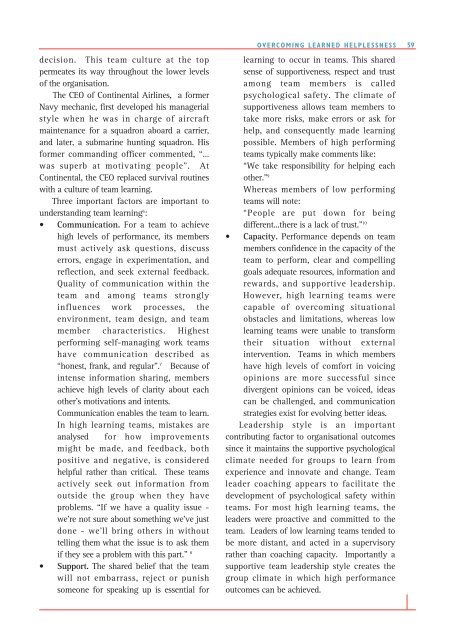ISSUE 150 : Sep/Oct - 2001 - Australian Defence Force Journal
ISSUE 150 : Sep/Oct - 2001 - Australian Defence Force Journal
ISSUE 150 : Sep/Oct - 2001 - Australian Defence Force Journal
You also want an ePaper? Increase the reach of your titles
YUMPU automatically turns print PDFs into web optimized ePapers that Google loves.
decision. This team culture at the toppermeates its way throughout the lower levelsof the organisation.The CEO of Continental Airlines, a formerNavy mechanic, first developed his managerialstyle when he was in charge of aircraftmaintenance for a squadron aboard a carrier,and later, a submarine hunting squadron. Hisformer commanding officer commented, “…was superb at motivating people”. AtContinental, the CEO replaced survival routineswith a culture of team learning.Three important factors are important tounderstanding team learning 6 :• Communication. For a team to achievehigh levels of performance, its membersmust actively ask questions, discusserrors, engage in experimentation, andreflection, and seek external feedback.Quality of communication within theteam and among teams stronglyinfluences work processes, theenvironment, team design, and teammember characteristics. Highestperforming self-managing work teamshave communication described as“honest, frank, and regular”. 7 Because ofintense information sharing, membersachieve high levels of clarity about eachother’s motivations and intents.Communication enables the team to learn.In high learning teams, mistakes areanalysed for how improvementsmight be made, and feedback, bothpositive and negative, is consideredhelpful rather than critical. These teamsactively seek out information fromoutside the group when they haveproblems. “If we have a quality issue -we’re not sure about something we’ve justdone - we’ll bring others in withouttelling them what the issue is to ask themif they see a problem with this part.” 8• Support. The shared belief that the teamwill not embarrass, reject or punishsomeone for speaking up is essential forOVERCOMING LEARNED HELPLESSNESSlearning to occur in teams. This sharedsense of supportiveness, respect and trustamong team members is calledpsychological safety. The climate ofsupportiveness allows team members totake more risks, make errors or ask forhelp, and consequently made learningpossible. Members of high performingteams typically make comments like:“We take responsibility for helping eachother.” 9Whereas members of low performingteams will note:“People are put down for beingdifferent...there is a lack of trust.” 10• Capacity. Performance depends on teammembers confidence in the capacity of theteam to perform, clear and compellinggoals adequate resources, information andrewards, and supportive leadership.However, high learning teams werecapable of overcoming situationalobstacles and limitations, whereas lowlearning teams were unable to transformtheir situation without externalintervention. Teams in which membershave high levels of comfort in voicingopinions are more successful sincedivergent opinions can be voiced, ideascan be challenged, and communicationstrategies exist for evolving better ideas.Leadership style is an importantcontributing factor to organisational outcomessince it maintains the supportive psychologicalclimate needed for groups to learn fromexperience and innovate and change. Teamleader coaching appears to facilitate thedevelopment of psychological safety withinteams. For most high learning teams, theleaders were proactive and committed to theteam. Leaders of low learning teams tended tobe more distant, and acted in a supervisoryrather than coaching capacity. Importantly asupportive team leadership style creates thegroup climate in which high performanceoutcomes can be achieved.59
















